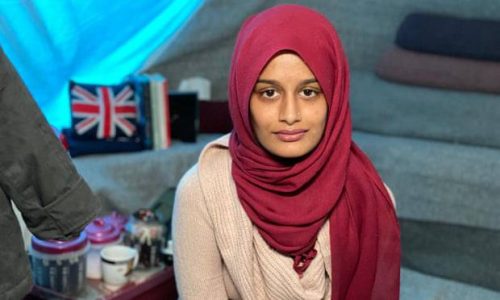
Shamima Begum says that her world fell apart after losing the UK citizenship
Shamima Begum has said her “whole world fell apart” when she discovered that she had been stripped of her British citizenship, in her first interview since she losing the appeal against the decision.
Pictured in a tent where she now lives in a refugee camp in north-east Syria, the 20-year-old said the decision made by the former home secretary Sajid Javid was not wholly unexpected but she had hoped for more lenient treatment.
“I kind of saw it coming because I did do my research just before I came out. I thought I would be a bit different because I had not done anything wrong before I came to Isis,” Begum said in an interview with the US broadcaster ABC News to be aired on Tuesday.
“When my citizenship got rejected, I felt like my whole world fell apart right in front of me. You know, especially the way I was told. I wasn’t even told by a government official. I had to be told by journalists.”
Earlier this month, Begum lost an appeal in a British court against having her British citizenship revoked last year by Javid. Although Begum had only ever lived in the UK before travelling to Syria to join Islamic State, the court held that she was eligible to apply for citizenship of Bangladesh, the birth country of her parents.
The broadcaster found Begum at al-Roj camp in Kurdish-run north-east Syria, where she was living in a relatively spacious heated tent with Kimberly Polman, a US-Canadian in her 40s who is waiting to hear whether she will be allowed to return to either country.
Begum entered the news again a year ago, after she was discovered at a different refugee camp by a journalist from the Times, four years after she had originally fled. At the time she was heavily pregnant with her third child, but the infant, Jarrah, died shortly after he was born.
The Times journalist said Begum seemed almost unrepentant in that and some of her other early interviews. At the time, she said: “I don’t regret coming here.”
But Begum – who had come to the camp from the final Isis redoubt in Baghuz – told ABC she felt threatened at al-Hawl camp when she arrived a year ago.
“I had just given birth. I was hearing all these stories about women threatening other women, you know, folk uncovering their faces or speaking to men, or doing interviews, or anything like that. I just was afraid for my life,” she told ABC.
Control of al-Hawl camp, which accommodates more than 65,000 people, has been described as being in the hands of “radical women”, the last supporters of Isis. Begum was moved from there to the smaller al-Roj, partly for her safety.
Begum is one of around 4,000 foreign women from more than 50 countries living in refugee camps in north-east Syria. The Syrian Kurdish authorities have said they will start putting on trial some of the 1,000 male foreign fighters held separately in prisons, but it is unclear what will happen to the women.
British security sources have argued that Begum represents a security risk, and that she was a member of al-Hisba, Isis’s morality police, during which time she carried a Kalashnikov and had a reputation for strictness. Begum also allegedly “stitched suicide bombers into explosive vests”.
Source: The Guardian





